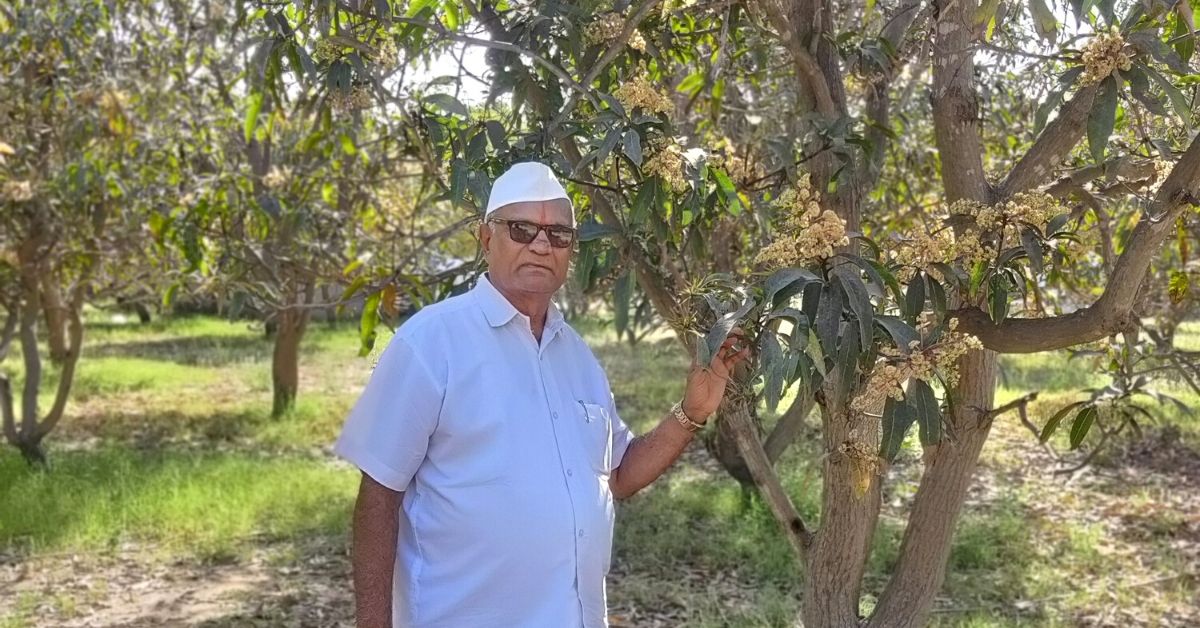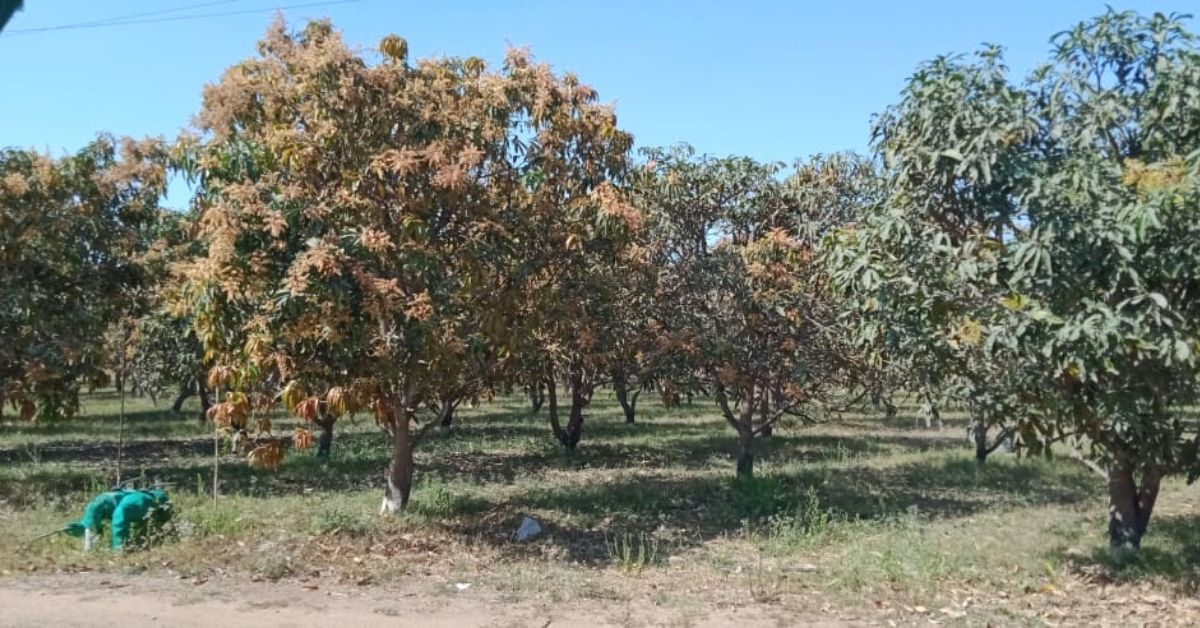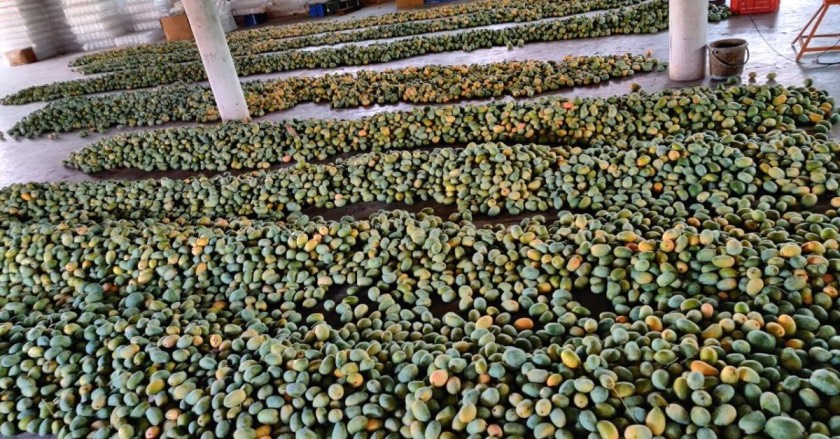Confessions of a Farmer on How the Switch to Organic Helped Him Earn Rs 23 Lakh
Gujarat-based farmer Veljibhai Bhudia grows a variety of organic fruits including Kesar mango, kiwi, coconut, pineapple, dates, lemon, etc

Over the past decade, farmers in India have consumed around 500 lakh metric tonnes (LMT) of chemical fertilisers. The data from the Central government shows that the use of toxic chemicals to grow food has increased multifold and poses health risks.
Gujarat-based farmer Veljibhai Bhudia has witnessed this first-hand on his farm at Madhapur village, located in Kutch district.
“I started farming with my father on his 13-acre farm. We grew sugarcane and made jaggery from it,” he tells The Better India, adding, “I quit school at the age of 13 in 1965 due to poor financial conditions.”
Veljibhai recalls that his father Kurji transported the jaggery to the market on a bullock cart selling it at 75 paise a kilo. “We toiled hard to earn our profits. Slowly, the profits helped our family of six survive and progress. We continued it until 1970. From 1971 to 1975, we took up bajra, wheat, grains and cotton cultivation,” he says.
Over the years, their fortunes from farming helped the family expand their farmland to 22 acres.
‘Am I Farming Or Sinning?’

“Using more land for cultivation, we expanded our products to grow vegetables like brinjal, okra, tomatoes, chillies, coriander and other seasonal varieties. Later on, we cultivated groundnut, mustard and castor,” he says.
Veljibhai says farming continued in full swing until the 1990s. “We prospered, earning Rs 70 lakh a year. We then purchased more agricultural land. But all the profits were earned using chemical farming methods on our farm,” he adds.
He says the use of chemical fertilisers and pesticides only increased with time. “Earlier, I used three sacks of urea for a 12-acre land which eventually increased to 800 sacks for farming 72-acres. We took three crops a year, using bore wells for irrigation,” he explains.
By then, Veljibhai’s three sons also joined the profession. “Those 800 sacks were 50 kg each comprising 40,000 kg of the chemicals that were pumped in the soil every year. This affected the soil quality and its water-retaining capacity,” he says.
Observing the use of enormous quantities of chemicals used for farming, Veljibhai even asked his sons for a solution to reduce the use of toxic substances. “I felt like I was sinning by using enormous amounts of chemicals to grow food that humans consume. Human health was directly getting impacted by the use of chemical fertilisers. I learned that the method was not sustainable and needed a change in approach towards conventional farming,” he says.
Veljibhai then travelled to places visiting farmers in the region to understand better farming practices. He learned about organic farming methods and decided to adopt them. “It required doing away with the chemicals and using cow dung, cow urine and other organic matter for farming. I was a bit sceptical about the produce and its output but decided to experiment with it regardless,” he says.
Since then, there has been no looking back for the farmer, successfully practising organic farming for over two decades.
In 2001, he decided to enter into horticulture and cultivate Kesar mango variety using organic methods. “I also installed a drip irrigation system and used mulching techniques. I made fertilisers using cow urine, jaggery, gram flour, cow dung to add nutrients to the soil. I sprayed buttermilk and cow milk, to prevent any pest infestation among plants,” he says.

Veljibhai cites an example of a person getting out of addiction to describe his experience of switching from chemical to organic farming.
“A person quitting tobacco suffers from nausea, dizziness and has withdrawal symptoms for months. My plants and soil behaved similarly and did not respond well during the initial months. Slowly, they started accepting the natural and organic nutrients from the soil. The microbial activity in the soil increased and fertility improved,” he says.
It took almost four years for Veljibhai’s farm to be converted into an entirely organic one. “I received the first harvest of mangoes in 2004 and tested the soil quality to find and that it had no chemical residues,” he says, adding, “Giving up chemicals helped me save Rs 15,000 per crop amounting to Rs 3 lakh a year alone.”
The first year, Veljibhai harvested 7 tonnes of mangoes, which gradually increased to 10 and 15 tonnes. Eventually, Veljibhai started growing chikoo (Sapota), pineapple, papaya, orange, dates and other fruit plants.
But unfortunately, he says the market was not entirely ready to accept organic farm produce. “I found it difficult to sell them in the market and hardly found customers. So I decided to process it into pulp and juices,” he says.
In 2006, Veljibhai set up a food processing unit and opened a restaurant outside the farm to lure customers. “My farm borders a highway, and I set up an enterprise to allow customers to taste the organic fruits and juices. It became a hit,” he adds.
“Eventually, the awareness on organic farming increased, and I received a premium price for my harvest. As the products became popular, I earned a monopoly in the market as very few farmers were growing organic fruits on a large scale,” he says.
Veljibhai further ventured into growing kiwi, dragonfruit, custard apple, guava, walnut, almond, banana, grapes, jamun, gooseberry, lemon and plum.
“Today, I offer 47 varieties of fruit items including pulp, juice, syrups and shakes — all ‘poison proof’. In 2011, I sold 50 acres of land as they were located in different geographical locations, making it difficult to tend to them. But the remaining 22 acres earn me Rs 16 lakh per year. The food processing adds another Rs 7 lakhs to our income,” he adds.
For A Healthier Environment

Now, Veljibhai goes above and beyond to help farmers replicate his organic success. “I have helped thousands of farmers to date. I conduct workshops for farmers every 12th to 15th of the month. My teachings include preparing organic fertilisers using cow urine and cow dung in the right proportions to make effective manure and other aspects of organic farming. Moreover, my cell phone is open to receive queries and guide farmers between 3 pm and 6 pm every day. But there is no day off, and hundreds of farmers seek help for organic farming from me every week,” he says.
Waljibhai Velji, a farmer from Gujarat, says he has benefitted from Veljibhai for the last 14 years. “I started organic farming by taking inspiration from Veljibhai to grow maize, pomegranate, mustard, dates and wheat. Organic farming can be labour intensive, but the harvest received is of premium quality which stands out in the market,” he says.
Waljibhai says the farming has helped him reduce his production costs by 20 per cent, thereby converting them into profits.
But despite his successes, Veljibhai has suffered setbacks. “The COVID-19 pandemic forced me to shut down my restaurant due to low footfall. But my sons and I devised ways to market my products on social media,” he says.
Over 20 years of practising organic farming, he considers it a significant time to prove that the method can be profitable. “Farmers should instil faith in organic farming and refrain from the use of chemicals for a healthier environment and human lives,” he concludes.
Sources:
(Edited by Yoshita Rao)
If you found our stories insightful, informative, or even just enjoyable, we invite you to consider making a voluntary payment to support the work we do at The Better India. Your contribution helps us continue producing quality content that educates, inspires, and drives positive change.
Choose one of the payment options below for your contribution-
By paying for the stories you value, you directly contribute to sustaining our efforts focused on making a difference in the world. Together, let’s ensure that impactful stories continue to be told and shared, enriching lives and communities alike.
Thank you for your support. Here are some frequently asked questions you might find helpful to know why you are contributing?


This story made me
-
97
-
121
-
89
-
167











